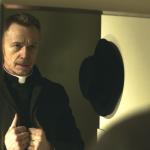Bartholomew Bogue
Meet The Magnificent Seven’s Despicable One. The wealthy mining magnate (played by Peter Sarsgaard) is determined to yank every last bit of gold there is from these hills, but the good town of Rose Creek is in his way. In the opening scene, we see him barge in on a meeting in the town’s church, striding to the pulpit while one of his lackeys spits tobacco on the floor.
“Democracy in this country has long been associated with capitalism, and capitalism with God!” He tells them. As such, Bogue insists, he’s doing God’s work—and it’d be a sin if the townspeople didn’t sell him their land for a pittance of what it’s worth. And once he makes his point, he herds the folks outside and lights the church on fire, beating the town preacher for good measure.
“If God didn’t want them sheared he wouldn’t have made them sheep,” he later says.
While The Magnificent Seven is mostly a pure popcorn flick, Bogue feels like pointed, timely commentary. For a few decades now, American evangelical Christians could be reliably counted to vote for Republican candidates. And it’s not hard to see Bogue as a caricature of Donald Trump—a man whose stance on abortion has flip-flopped several times and whose commitment to faith can be read (by cynics like me at least) as opportunistic.
But even if the movie isn’t drawing a dotted line between its main villain and the presidential candidate, the overall critique is still relevant: There are those who use the language of faith to justify their own very selfish actions. They twist Christianity into something it’s not—and in so doing, leave the faith a burned-out shell.














